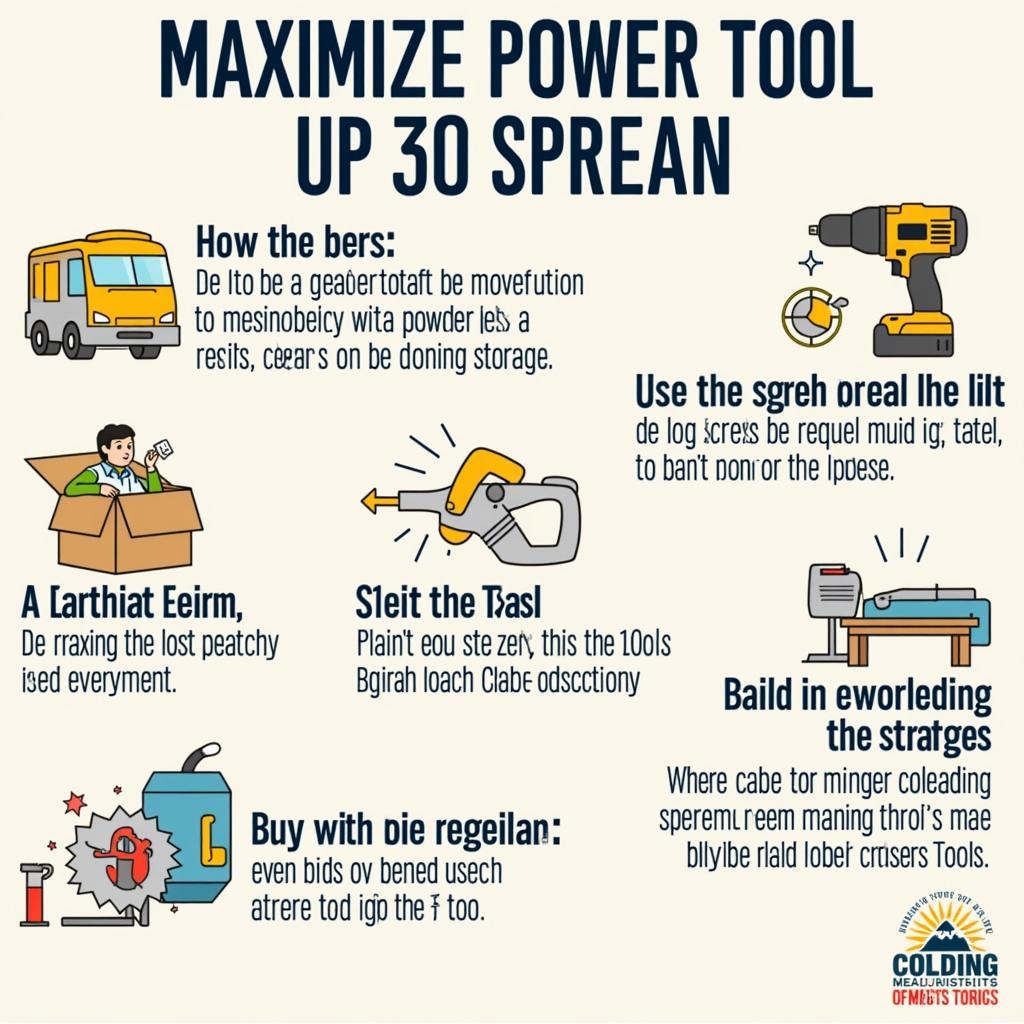Maintaining your battery-operated tools is crucial for their longevity and performance. Proper Battery Operated Tools Care Directions can save you money and frustration in the long run. This comprehensive guide will cover everything you need to know, from battery maintenance to proper storage, ensuring your tools are always ready for action.
Understanding Your Battery Operated Tools
Different battery operated tools require different care, but some fundamental principles apply across the board. Knowing your tool type, battery type (NiCd, NiMH, Lithium-ion), and specific manufacturer recommendations is essential. This knowledge forms the foundation of proper care.
Battery Care: The Heart of Your Tools
Charging Best Practices
Charging your batteries correctly can significantly extend their lifespan. Avoid overcharging, which can damage the cells and reduce their capacity. Similarly, letting batteries completely discharge before recharging is detrimental, especially for older battery chemistries. For lithium-ion batteries, partial discharges are preferred.
Storage Solutions for Optimal Battery Life
Store your batteries in a cool, dry place, away from direct sunlight and extreme temperatures. For long-term storage, consider removing the batteries from the tools and storing them at a slightly discharged state. This prevents deep discharge and potential damage.
Tool Maintenance: Beyond the Battery
Cleaning and Lubrication: Keeping Things Running Smoothly
Regularly clean your battery-operated tools after each use to remove dust, debris, and any corrosive materials. Lubricate moving parts as recommended by the manufacturer to prevent friction and wear.
Inspection and Repairs: Addressing Potential Issues
Regularly inspect your tools for any signs of damage, loose parts, or wear and tear. Address any issues promptly to prevent further damage and ensure safe operation.
Troubleshooting Common Battery and Tool Problems
Battery Not Holding a Charge?
If your battery isn’t holding a charge, it might be time for a replacement. However, before you buy a new one, try cleaning the battery terminals and checking the charger. Sometimes, a simple cleaning can resolve the issue.
Tool Not Performing as Expected?
If your tool isn’t performing as expected, check the battery charge, the tool’s settings, and any attachments. If the problem persists, consult the manufacturer’s troubleshooting guide or seek professional help.
Extending the Life of Your Battery Operated Tools
 Effective Strategies to Extend the Life of Your Power Tools
Effective Strategies to Extend the Life of Your Power Tools
By following these battery operated tools care directions, you can significantly extend the life of your tools and ensure they are always ready for your next project. This proactive approach saves you money and reduces the environmental impact of constantly replacing tools.
Conclusion
Proper care of your battery operated tools is an investment in their longevity and performance. By following these guidelines, from battery maintenance to regular tool cleaning, you’ll ensure your tools are always in top condition, ready to tackle any task. Remember, proper battery operated tools care directions are essential for both performance and longevity.
FAQ
-
How often should I charge my battery-operated tools? Ideally, charge them after each use or when the battery indicator shows a low charge.
-
What is the best way to store batteries long-term? Store them in a cool, dry place at a slightly discharged state.
-
Can I use any charger for my battery-operated tools? No, always use the charger recommended by the manufacturer.
-
How do I clean my battery-operated tools? Use a dry cloth or brush to remove dust and debris. Avoid using water or harsh chemicals.
-
What should I do if my tool isn’t working properly? Check the battery, settings, and attachments. If the problem persists, consult the manufacturer’s troubleshooting guide.
-
What are some signs that my battery needs replacement? If it’s not holding a charge, charging very quickly, or the tool’s performance is significantly reduced.
-
How often should I lubricate my tools? Refer to the manufacturer’s recommendations for the specific lubrication schedule.
Common Scenarios and Questions
- Scenario: My drill battery dies quickly even after a full charge. Possible Solution: The battery may have reached the end of its lifespan and needs replacement.
- Question: Can I leave my battery on the charger overnight? Answer: It’s generally not recommended to leave batteries on the charger for extended periods. Overcharging can damage the battery.
Further Reading
Check out our other articles on tool maintenance and repair for more in-depth information. You can also find specific care guides for different tool types on our website.
Need assistance? Contact us via WhatsApp: +1(641)206-8880, Email: [email protected] or visit our office at 910 Cedar Lane, Chicago, IL 60605, USA. We have a 24/7 customer support team ready to assist you.

Leave a Reply